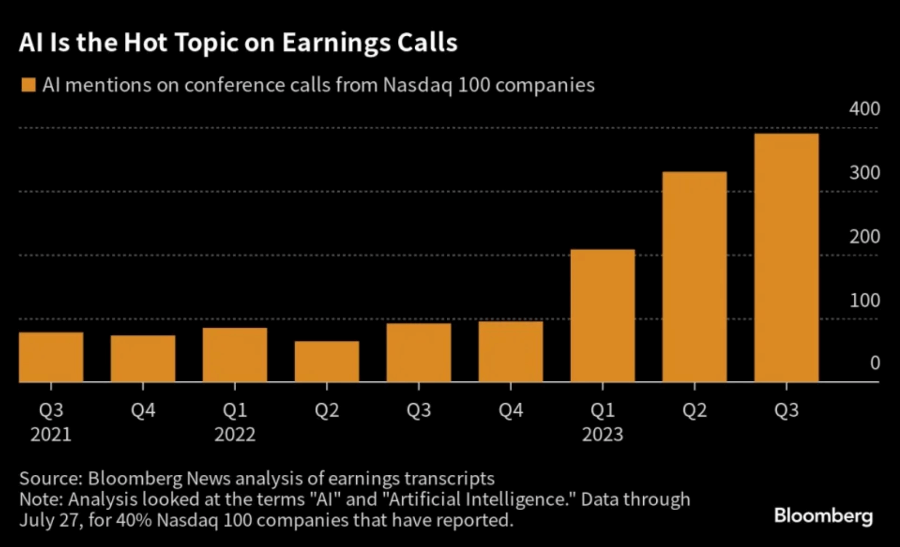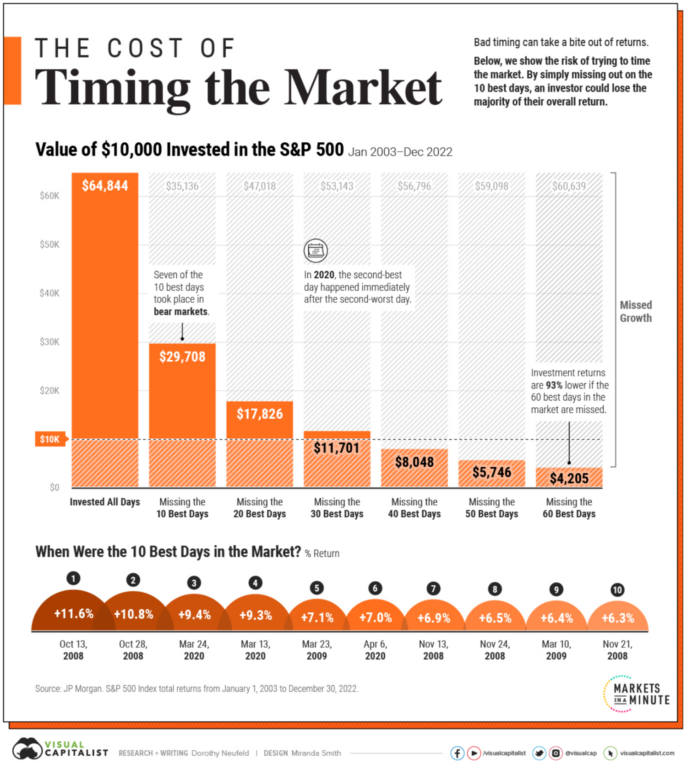Making sense of the markets this week: August 27, 2023
Nvidia earnings shock markets, RBC cruises along while TD hits some turbulence, U.S. retail skews towards consumer staples, and market timing doesn’t pay.
Advertisement
Nvidia earnings shock markets, RBC cruises along while TD hits some turbulence, U.S. retail skews towards consumer staples, and market timing doesn’t pay.

Kyle Prevost, editor of Million Dollar Journey and founder of the Canadian Financial Summit, shares financial headlines and offers context for Canadian investors.
The old story goes… while most people lost money pursuing their fortunes during the gold rush, the companies that sold the picks and shovels universally made a fortune.

While virtually every company is claiming it’s going to use artificial intelligence (AI) to make its business better, the folks selling the “silicon picks and shovels” are the ones actually making the money.

Nvidia (NVDA/NASDAQ) shares surged 8% in extended trading on Wednesday after the computer chip maker crushed its already sky-high earnings expectations. (All numbers in this section are in U.S. dollars.) Earnings per share came in at a scorching $2.70 (versus $2.09 predicted), while revenues totalled $13.51 billion (versus $11.22 billion predicted).
The incredible AI-powered run that Nvidia has been on in the last 12 months is wild. Here are a few facts and quotes, resulting from Wednesday’s historic earnings call.
There is no real way to know which companies will eventually use AI to cut costs and increase revenues. What we can say for sure is that a lot of picks and shovels will be sold.
Here’s something to “pick” your brain, though: Should you trust AI for financial advice?
While the news continues to be shaky for regional U.S. banks earlier this week, Canada’s two largest publicly traded companies continue to show overall strength throughout their balance sheets, even if short-term investors don’t want to reward them.
RBC noted that its pre-tax earnings were up 7% from a year ago, and that net interest income and loan volume growth were both up in the Canadian market. The bank’s important CET1 capital ratio is 14.1%, which is considerably above the Office of the Superintendent of Financial Institution’s minimum of 11.5%. The CET1 ratio is basically the bank’s “rainy day fund” that would allow it to soak up loan losses when lending doesn’t get paid back.
Despite the excellent quarter, RBC highlighted that it wants to continue reducing employment by 1% to 2% over the next three months. RBC president and chief executive officer Dave McKay stated, “We remain focused on executing on our cost reduction strategy.”
While the news wasn’t quite as sunny over at TD, it certainly wasn’t all bad. With the termination of its deal for U.S. regional bank First Horizon Corp, TD announced that it plans to use that pile of cash to buy back 90 million shares this year.
TD CFO Kelvin Tran stated, “We have significant excess capital and we’re happy to return that back to shareholders.”
Unlike RBC, TD announced it is looking to add jobs over the next few months. With expenses up 24% on a year-over-year basis, analysts are likely to be watching for increased spending discipline from the financial services provider. Meanwhile, TD is currently boasting a CET1 ratio of 15.2%, and consequently it is well fortified for any potential downturns.
You can read more about investing in RBC and TD Bank stocks at MillionDollarJourney.ca.
Along with last week’s U.S. retail earnings, a fuller picture is beginning to form for retailers specializing in niche discretionary goods. They’re taking a bigger hit than retailers like Walmart and Dollar Tree. (All numbers in this section are in U.S. dollars.)
The theme for retail earnings calls over the past few weeks has been that consumers are increasingly under inflationary pressure and are looking to pare back discretionary spending on goods. This is likely music to the ears of the world’s central bankers, who are meeting in Jackson Hole this weekend.
It can be too easy to get caught up in the news of the day and put too much emphasis recent headlines, especially when it comes to making long-term decisions. The crew at Visual Capitalist created this beautiful reminder of:

Never forget that, as a whole, big corporations are really good at making money. It’s important to keep this at the forefront of your decision-making process, and not allow recency bias to overcome your logical long-term investment strategy.
Share this article Share on Facebook Share on Twitter Share on Linkedin Share on Reddit Share on Email